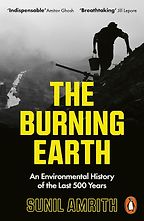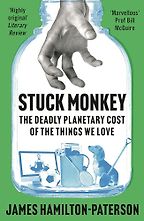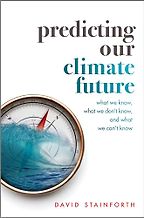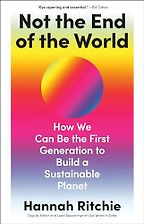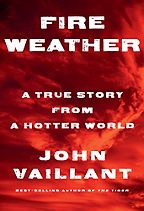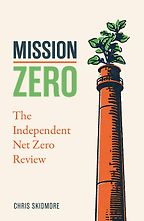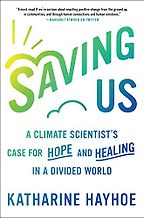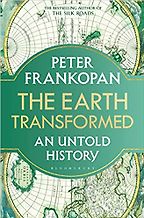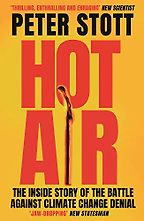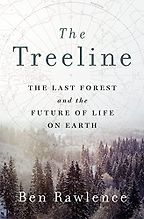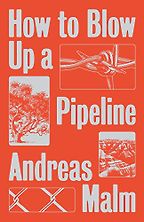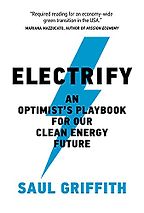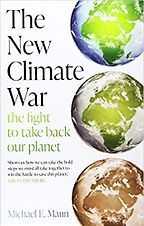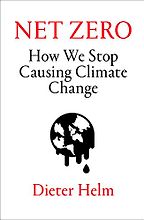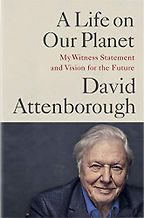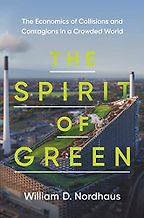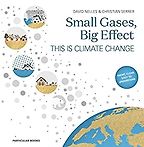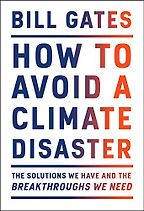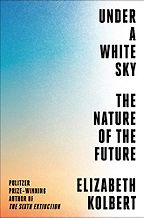New Climate Books
Last updated: October 16, 2025
In the 13 years to 2016, Antarctica lost a mass of 141 billion tonnes from its ice sheet every year, according to Small Gases, Big Effect, a beginner's guide to what's happening in our environment and one of many new books coming out now on climate change. It's an issue that's a top priority for all of us, and we'll be keeping an eye out for interesting books as they come out. (The switch to renewable energy is a key part of the challenges we face, and our interview on energy transitions is a good place to start on that particular aspect of the road ahead).
See all our Five Books interviews related to books about climate change
“It shows that you can’t tell history—whether it’s the history of the past 50 years or the past 500 years or the past 1000 years—without paying attention to the role of the environment. The environment is not something that’s happening on the side of history. They’re intertwined, and you can’t separate them out. The book shows this really compellingly. It illustrates how events that we might think about as completely unrelated were connected through the environment. For instance, Amrith mentions research suggesting that the European invasion of the Americas that started in 1492 with Columbus contributed to the Little Ice Age that lowered temperatures all over the world. Perhaps the freezing over of the Thames in the 1600s was caused in part by the conquest of the Aztec empire on the other side of the Atlantic a century earlier.” Read more...
The Best Nonfiction Books: The 2025 British Academy Book Prize
Rebecca Earle, Historian
“The monkeys, of course, are us. At the beginning of the book, James Hamilton-Paterson describes this tribe of hunters who hunt monkeys and eat them. The way they do it is they put a banana in a jar with a narrow entrance, and the monkeys can’t resist the banana. They put their hand in, and even though they could get their hand out, they don’t because they’re just addicted to it. What he is essentially saying is, ‘Look, before you get too carried away with various other explanations, remember there’s something fundamental about us humans and what we’re doing. That’s why our planet is going the way it’s going.’ Essentially, it’s about the fact that deep in our human nature is an insatiable desire to consume. We just can’t resist it…Hamilton-Paterson’s book is so well written. It’s confronting everyone’s prejudices…The book is in your face, in a very easy-going way. I thought it was a brilliant book. And it’s sobering.” Read more...
“Predicting Our Climate Future is a wonderful book because it doesn’t try to make it all very simple, but it does make it understandable. Stainforth addresses lots of issues in the book, but a central issue is, ‘This is fundamentally uncertain. If you want certainty—if you want to know exactly how much climate change is going to be, what’s going to happen to the weather, whether it’s going to be wetter next winter—you can’t have that.’” Read more...
“Data scientist Hannah Ritchie, head of research at Our World in Data, has a book out on climate change entitled Not the End of the World. Ritchie says she’s inspired by the late Swedish epidemiologist Hans Rosling (author of Factfulness) and the book is very much in the vein of ‘we’ve achieved a lot, let’s not despair.’ It’s a climate-change pep talk, I suppose, but based on facts and data.” Read more...
Nonfiction Books to Look Out for in Early 2024
Sophie Roell, Journalist
Fire Weather: A True Story from a Hotter World
by John Vaillant
🏆 Winner of the 2023 Baillie Gifford Prize for Non-Fiction
“This book comes out of that fine North American tradition of nonfiction writing—a deeply researched and meticulously told account of a real event. It’s about a fire that happened up in the subarctic region of Canada, which is, by definition, very remote. It’s a very hard place to earn a living and it tells you a lot about human beings that tens of thousands of people have moved up there to work in the tar sands industry. This is a part of the oil industry that should be marginal because it’s very difficult to get the oil out. You have to expend huge amounts of electricity and natural gas to lift the sands and then to melt and render out the oil…Fire Weather tells the story of what happens when everything goes wrong and the unthinkable happens…this fire in 2016 went completely out of control. There are various reasons for that, but it points to a bigger issue around changes in the climate. The author gives you a very vivid account of that extraordinary event, which affected 90,000. It destroyed much of this place, Fort McMurray, and made a lot of people homeless. 2,400 structures were destroyed and 1,000 more were damaged.” Read more...
The Best Nonfiction Books: The 2023 Baillie Gifford Prize Shortlist
Frederick Studemann, Journalist
Mission Zero: The Independent Net Zero Review
by Chris Skidmore
Everyone is worried about climate change, and many of us want to do our bit to help. At the end of the day, however, it's governments that will have to take the lead. Mission Zero is by Chris Skidmore, a British politician (and medieval historian) and is the outcome of an independent review of 'Net Zero', the UK's policy to reduce emissions to net zero by 2050. It's written in bullet points, so it may not be bedtime reading, but it is essential reading if you live in the UK and are involved in public policy. Overall, "it's a detailed, structured and thoughtful plan about what needs to be done and how to achieve it," according to Charlie Maynard, a politician for a different UK political party.
“She is a climate scientist as well as an evangelical Christian and a Canadian who lives in Texas, so she covers a lot of ground. This book was written on the back of a TED talk she gave that almost four million people have viewed. She is someone who uses all of the channels and mechanisms that she can to get the word out, which I heartily approve of.” Read more...
The Best Climate Books of 2021
Sarah Dry, Science Writer
The Earth Transformed: An Untold History
by Peter Frankopan
The Earth Transformed is by Peter Frankopan, a professor of global history at the University of Oxford and a specialist on Byzantium. However, in The Earth Transformed he tells the story not of political dynasties and wars but of the world's climate. Frankopan is a nice writer so this is a good way to get up to speed on the world's climate history, though it is long—650 or so pages—so it's more compendium of information than quick summary.
“This is a hugely chilling, but massively well-informed book. Obviously, a lot has been written already about climate change, but this should not put people off. The thing about Peter Stott is that it was he and his colleagues who were trying to persuade the world and particularly the powers that be that not only was global warming happening, but it was human activity that was making it happen. At the beginning, the consensus was that, well, the sea temperatures are going up, the snow is melting, but this is just something happening to the universe, this is not anything to do with us…It is satisfying that, now, every sensible person in the world knows that Stott and his colleagues were right. So this is a story of persistence, resilience and bravery. I like to think of it as the power of science: that, in the end, the scientific evidence will win out. It might take a long time, but it does. And that, of course, is what the Royal Society is all about.” Read more...
The Best Popular Science Books of 2022: The Royal Society Book Prize
“The Treeline is a journey around the Arctic Circle, which is also—at the moment—just about the growing limit of trees in the north. It’s a journey of discovery of what’s happening to that treeline as the planet warms, and what that might mean for humanity as a whole. We meet individual species in six chapters around the top of the world, from Scotland, Scandinavia, Siberia, Alaska, Canada, and Greenland. We also meet scientists and people living in those regions. It’s a blend of travelogue and science. And I hope it’s both a journey of wonder, as the reader experiences these incredible places and incredible people, but also an invitation to reflect on what’s happening and weave in some of the anthropology and sociology about why we are where we are.” Read more...
The best books on Climate Adaptation
Ben Rawlence, Environmentalist
“The book could more accurately be titled, ‘why blowing up a pipeline should potentially be part of the climate activist’s toolkit’. Or perhaps it should be called, ‘how to puncture a tire’. Malm is now a very productive academic in Sweden, who’s written several books on the history of what he calls ‘fossil capitalism’, linking climate change and capitalism. He calls himself an eco-Marxist, so he’s quite open about his political perspective. But he started out his young adult life in climate activism and one of the things that he did as a climate activist was to go around letting the air out of SUV tires. He uses that as an example of the strategic use of violence that he’s advocating.” Read more...
The Best Climate Books of 2021
Sarah Dry, Science Writer
“The subtitle of this book is ‘an optimist’s playbook for our clean energy future’. That’s very accurate: it’s optimistic, and it’s a playbook. It reads a bit like a PowerPoint presentation and I mean that in a good way. It’s very clear, it’s very practical, it’s very possiblist. It’s very much focused on the technical rather than the political without being naive about the need for political will. What are the technical possibilities for addressing climate change? Saul Griffith’s answer is that we already have the most important technical solution in front of us and it’s electrification. Basically, it’s very simple: we have to electrify everything and we have to do it as quickly as possible.” Read more...
The Best Climate Books of 2021
Sarah Dry, Science Writer
The New Climate War: The Fight to Take Back Our Planet
by Michael E Mann
In The New Climate War Michael E Mann, Distinguished Professor of Atmospheric Science at Penn State, analyzes why we seem to be unable to move forward with combating climate change and pins the blame firmly on corporations. Like tobacco companies and gun makers in the past, fossil fuel companies deflect attention. (A graphic novel by Mann has previously been recommended on Five Books, by Professor Naomi Oreskes of Harvard, who recommended it among her books on 'the politics of climate change').
The implications of this latest book are critical for how we, as individuals, take action. As Mann writes, "Personal actions, from going vegan to avoiding flying, are increasingly touted as the primary solution to the climate crisis. Though these actions are worth taking, a fixation on voluntary action alone takes the pressure off of the push for governmental policies to hold corporate polluters accountable. In fact, one recent study suggests that the emphasis on small personal actions can actually undermine support for the substantive climate policies needed."
“The book is kind of ‘here’s the problem, here is how we got ourselves into this mess and here is Professor Dieter Helm’s idea of how we get ourselves out of it.’ We’re coming up to COP26 and he gives fairly short shrift to all the international efforts that we’ve made so far and says, ‘Here is what the UK could just get on and do.’ At the moment, we’re not counting the true cost of pollution. The person or the company that created it doesn’t pay for it. We’re also not counting properly the amount of emissions that we create offshore, which is pertinent at a time of free trade deals. We say, ‘It’s okay. We’re not growing chickens (or whatever it might be), we’re importing them. We can discount all those emissions because they happen in Australia. His point is, ‘yes, but they only happen because of us, so we should count them.’ I’m no economist, but it’s very readable and very clear, and quite angry. He is not happy. There’s a real sense of ‘Argh!’ throughout it.” Read more...
“It’s really powerful, partly because he starts as a child. The first bit is about when he was 11 and, when he finishes the book, he’s 94…He just writes so well, and so clearly, about what it was and what it is. Then the second part of the book is ‘That’s the problem. Those are my memories. This is the mess we’ve got ourselves into—and here’s what we can do about it.’ So it is a hopeful book, in the end…It’s very readable. I think it’s because both Sir David and Johnnie write TV scripts. A TV script is quite sparse in comparison with writing a novel or a book, you have a lot fewer words. It really benefits from that because it’s readable and clear. I really liked it.” Read more...
The Spirit of Green: The Economics of Collisions and Contagions in a Crowded World
William Nordhaus, an economist at the University of Yale who won the 2018 Nobel Prize for economics, has written a book about environmentalism. His Nobel Prize was awarded "for integrating climate change into long-run macroeconomic analysis" and the book is worth reading just to get a sense of what the tools of economics can do to analyze the climate crisis and provide solutions. The short answer: a lot.
Small Gases, Big Effect
by Christian Serrer & David Nelles
This book by two 24-year old German students has become a surprise bestseller in Germany. Originally self-published in German—with the price set at less than the cost of a pizza—it'll soon be available in English for the first time. It's a practical primer on climate change: as the authors point out, there's no need to exaggerate, the facts are bad enough to speak for themselves.
How to Avoid a Climate Disaster: The Solutions We Have and the Breakthroughs We Need
by Bill Gates
How to Avoid a Climate Disaster is Bill Gates’s contribution to addressing the problem of the climate change. It covers both his personal contribution—how he offsets flying around in a private jet—and more, importantly, what needs to be done at a global level and how those goals can be achieved. If climate change is something you’ve been aware of and concerned about, but never focused on, it’s a great place to start. It’s practical and upbeat—an easy, informative read.
Under a White Sky: The Nature of the Future
by Elizabeth Kolbert
Elizabeth Kolbert won the Pulitzer Prize for her 2014 bestselling book, The Sixth Extinction, and her 2006 book, Field Notes from a Catastrophe, has also been recommended on Five Books, so it's no surprise that Under a White Sky has been anticipated environment/climate change books of the year. It's a look at what scientists are doing to save the planet, which can be very scary at times.
